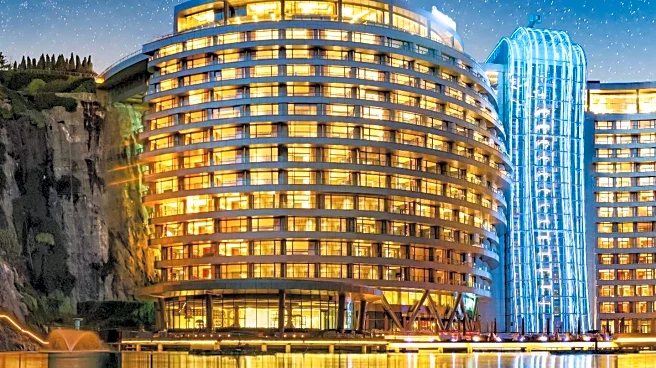What's Happening?
Lifestyle hotels are experiencing significant growth in Asia as travelers increasingly seek accommodations that offer more than just basic amenities. According to JLL's Global Hotel Investment Outlook
2025, the global share of lifestyle rooms in new hotels has doubled since 2000. These hotels cater to guests' interests in art, music, fashion, and work, providing environments that encourage mingling among like-minded travelers. The Asia-Pacific region has seen the strongest growth, with room supply quadrupling from 2014 to 2024 and expected to grow another 34% by 2027. China leads the region in lifestyle hotel supply, followed by Southeast Asia, which has three times more rooms than Australia, New Zealand, and South Asia. Lifestyle brands are expanding due to investor and guest demand, with international hotel chains acquiring brands like NoMad, CitizenM, and The Standard.
Why It's Important?
The rise of lifestyle hotels reflects a shift in consumer preferences towards experience-driven travel, impacting the hospitality industry globally. This trend is significant for hotel operators and investors, as it opens opportunities for growth and diversification in the market. Established hotel companies are capitalizing on this demand by acquiring lifestyle brands, which can lead to increased competition and innovation in the sector. The expansion of lifestyle hotels in Asia also highlights the region's growing influence in the global tourism market, potentially attracting more international travelers and boosting local economies.
What's Next?
Lifestyle hotels are expected to continue expanding in Asia, driven by ongoing demand from travelers seeking unique experiences. Hotel operators may focus on enhancing their offerings to cater to diverse interests, potentially leading to collaborations with local artists, musicians, and designers. As the market grows, there may be increased competition among hotel chains to acquire popular lifestyle brands, further shaping the industry's landscape. Additionally, the trend could influence traditional hotels to adapt their services to meet changing consumer expectations.
Beyond the Headlines
The growth of lifestyle hotels may have broader cultural implications, as they promote cross-cultural interactions and understanding among travelers. By offering environments that reflect local culture and interests, these hotels can contribute to preserving and showcasing regional heritage. Furthermore, the trend may encourage sustainable tourism practices, as travelers become more conscious of their impact on local communities and environments.











